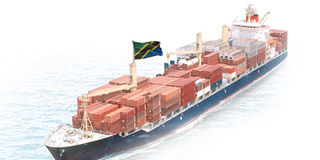Know the agency at centre of ships row

“The vessels flying the (Tanzanian) flag are entitled to enter into a private agreement with the surveying organisation authorised to act on behalf of TZIRS,” says part of information posted on the TZIRS website.
What you need to know:
- TZIRS was established in 2008 in accordance with the Registration of Maritime Transport Act of 2006, and is mandated to register foreign vessels that need to fly the Tanzanian flag temporarily or permanently. Officials of the agency are appointed by the Union and Zanzibar governments, according to information posted on the TZIRS website.
Dar es Salaam. The Tanzania Zanzibar International Register of Shipping (TZIRS) is the agency at the centre of the controversy surrounding the assigning of the Tanzanian flag to 50 vessels believed to be owned by or linked to North Korea.
TZIRS was established in 2008 in accordance with the Registration of Maritime Transport Act of 2006, and is mandated to register foreign vessels that need to fly the Tanzanian flag temporarily or permanently. Officials of the agency are appointed by the Union and Zanzibar governments, according to information posted on the TZIRS website.
The Citizen reported last week that an investigation had established that Democratic People’s Republic of Korea vessels had been using the Tanzania’s flag since March, this year, in what could constitute a breach of the UN’s Resolution 2270.
It was not the first time that vessels linked with a country under UN sanctions had been allowed to use the Tanzanian flag. From 2012 to 2013 vessels owned by Iranians or linked with Iran were found to be flying the Tanzanian flag in breach of UN sanctions.
TZIRS eventually suspended a Dubai-based agent that assigned the Iranian vessels the Tanzanian flag.
The TZIRS is a constituent corporation of the Zanzibar Maritime Authority (ZMA) created solely for the purpose of registering foreign vessels.
It is wholly owned by the Revolutionary Government of Zanzibar, according to ZMA Director General Abdallah Hussein.
TZIRS has being using organisations that fall under the International Association of Classification Societies Limited (IACS) and non-IACS organisations to undertake marine surveys and issue certificates to foreign vessels as per Resolution number A. 739 (18) of the International Maritime Organisation (IMO).
“The vessels flying the (Tanzanian) flag are entitled to enter into a private agreement with the surveying organisation authorised to act on behalf of TZIRS,” says part of information posted on the TZIRS website.
But these organisations, also called agents or authorised entities, are to blame for assigning the Tanzanian flag to vessels from countries that were under UN sanctions, Mr Hussein told The Citizen in an interview.
“From now one we will not use agents. Registering foreign vessels will be done by ZMA,” he said.
Mr Hussein, however, declined to disclose agents that had assigned the North Korean vessels the Tanzanian flag.
Despite the fact that some countries allow foreign vessels to fly their flags for a fee, the business is tricky. This is because many vessels ditch the flags of their own countries to evade sanctions, as in the case of North Korea, or to circumvent safety, labour or environmental regulations.
TZIRS works with eight organisations under the IACS agreement, while ten others are non-IACS.
Organisations falling under IACS are the American Bureau of Shipping (ABS), Bureau Veritas (BV), China Classification Society (CCS), Lloyds Register of Shipping (LR), Germanischer Lloyd (GL), Nippon Kaiji Kyokai (NKK), Det Norske Veritas (DNV) and the Korean Register of Shipping (KR).
Non-IACS entities aee the American Register of Shipping (ARS), Maritime Technical Systems and Services Limited (MTSS), Dromon Bureau of Shipping (DBS), Maritime Bureau of Shipping (MBS) and the Intertek Maritime Bureau (ITMB).
Others are the Venezuelan Register of Shipping C.A, Maritime Lloyd, Conarina Group N.A., Caspian Register of Shipping and the Isthmus Bureau of Shipping.
TZIRS has an administration office in Dubai in the United Arab Emirates (UAE) with seven regional offices in the US, Lebanon, Turkey, Egypt, India, Romania and Singapore.
TZIRS normally provides vessels with provisional registration, registration of transfer or transmission, special registration and permanent registration.
“Vessels which are provisionally registered are given a three-month permission to operate with a possibility to be extended for another three months to give owners and representatives of the ship time to gather important documents for permanent registration,” information on the agency’s website says.
Conditions for registration
The fact that vessels linked to countries under UN sanctions are allowed to fly the Tanzanian flag means there are possible loopholes during the registration process.
Companies registering with TZIR are required to produce documents such as a copy of certificate of incorporation, and a copy of passports of key managers that help establish the origins of the company.
“We thoroughly scrutinise the documents to ensure that we register vessels that come from countries that are not under sanctions or that are not engaged in illicit trade. Documents we request include the bill of sales, which establishes vessel ownership,” Mr Hussein said.
“We also establish the nationality of the vessel owner, address and collect any other additional information from respective agents who have vetted the client.”
Despite this, companies from pariah states have managed to register with TZIRS.
Mr Hussein said it was difficult to know the nationality of owners of the vessels, crew or whether the ships operates for countries sanctioned by the UN or the international community when they use front companies registered in other countries.
“Some of the alleged vessels from North Korea that we de-registered came with evidence that showed they belonged to countries such as Panama and Malaysia.”
Mr Hussein said ZMA was considering to increase the frequency and intensity of inspections as well as making the registration criteria stricter to ensure such incidents don’t occur again in the future. This will also go hand-in-hand with reducing the role of agents.
Mr Hussein declined to say how much they charge to register foreign owned vessels.
“The fee depends on the size and gross registry tonnage (GRT) of the respective vessel,” he said.




